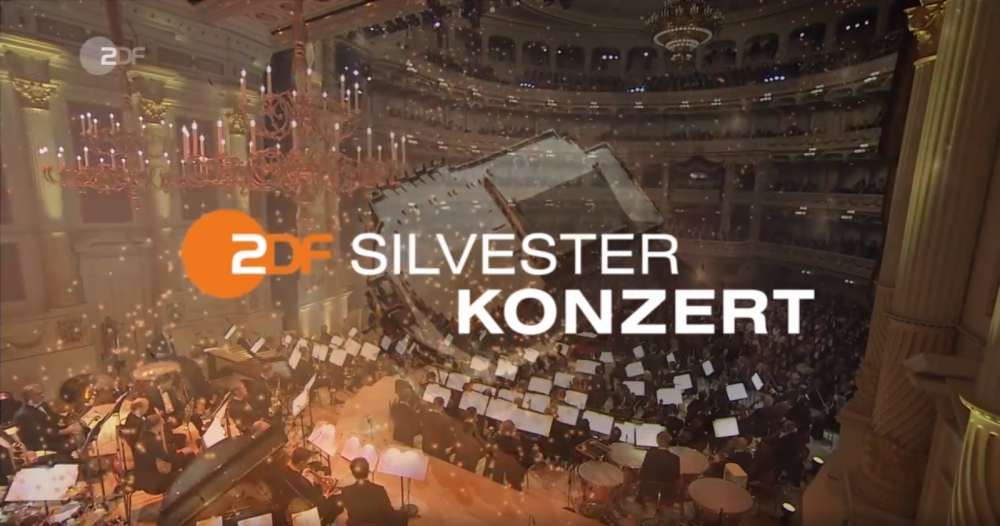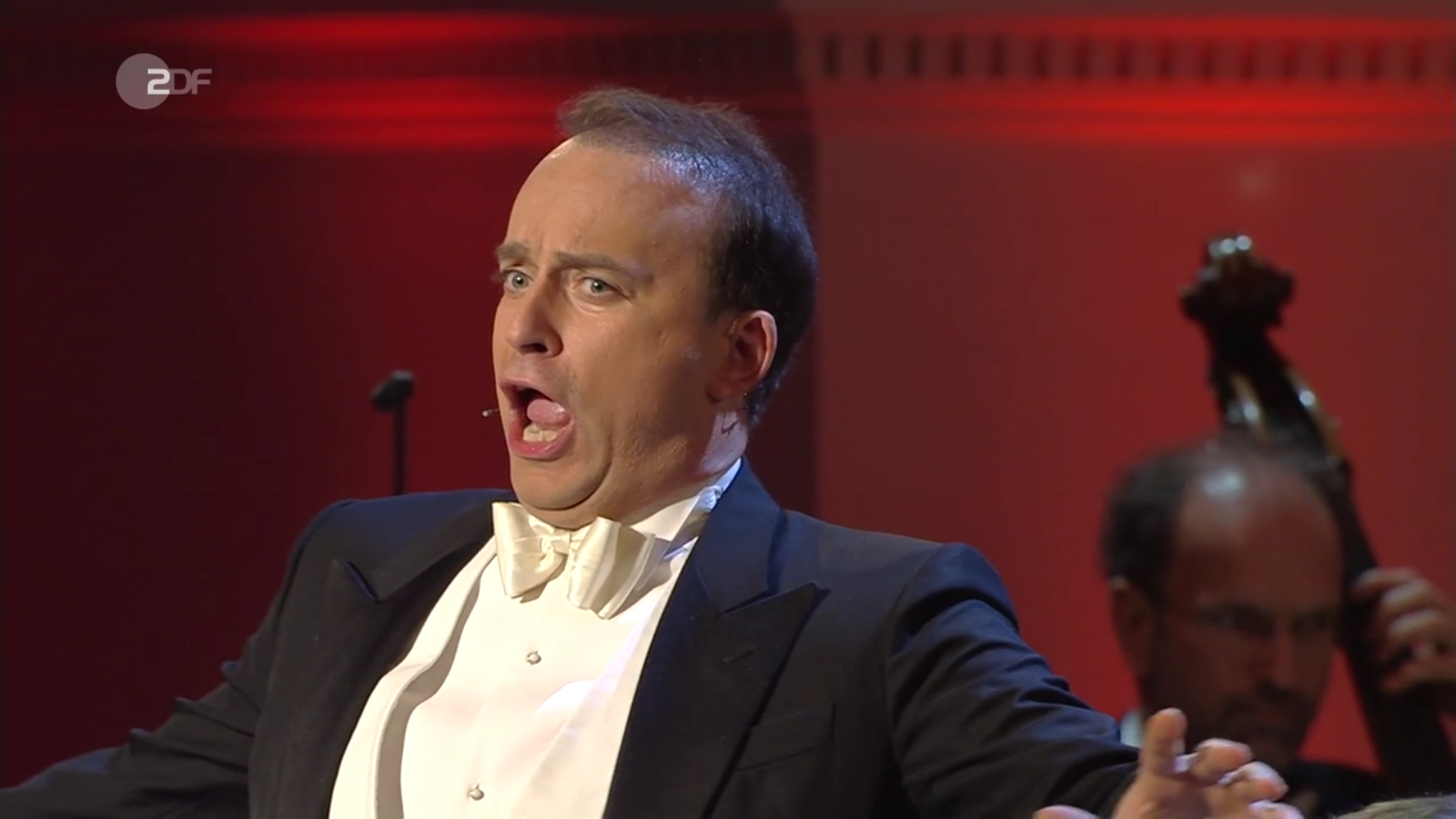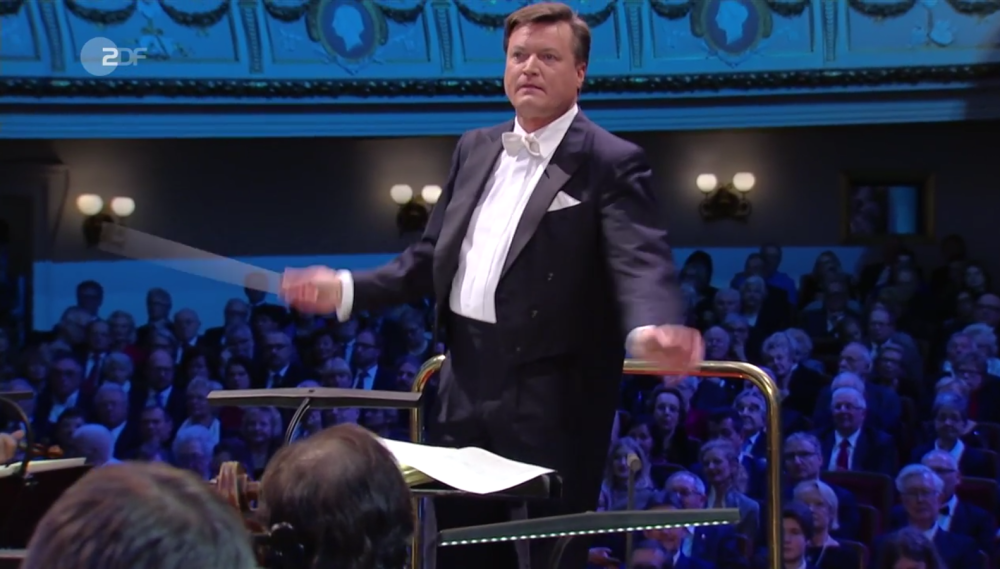Kevin Clarke
Operetta Research Center
2 January, 2018
Yes, it’s that time of year again when New Year’s concerts are unavoidable. It’s also the time when those in charge of these concerts think it’s a good idea to dig up ‘operetta,’ or what they consider to be operetta. One who has done so on a grand scale, and multiple times, is Christian Thielemann in Dresden at the Semperoper. After Lehár and Kálmán extravaganzas – concerts that have been so extravagantly awful, stylistically speaking, that they deserve a special place in any operetta performance history – he has dedicated the 2017 New Year’s concert to music from films by German film company UFA. Remember, that’s the company that gave us film operetta classics such as Die drei von der Tankstelle and Der Kongress tanzt in the early 1930s, and then many Nazi favorites starring Zarah Leander and Marika Rökk, or Johannes Heesters. While the songs from these movies have become evergreens, and an integral part of German culture, they are not material you would generally associate with Christian Thielemann or the Staatskapelle Dresden, celebrated worldwide for Wagner, Bruckner and Richard Strauss.

Opening titles of the 2017 New Year’s concert from Dresden in ZDF. (Photo: Screenshot)
To start the program, there was Korngold and music from his Hollywood movie Captain Blood. Which is decidedly not a UFA title. Korngold had to leave Germany – like many others – in 1933, it’s the same year that UFA fired all their ‘Jewish’ employees and cancelled contracts for future projects. Among the fired people was Werner Richard Heymann, but also Erik Charell who was scheduled to turn The Odyssey into a film operetta, starring Hans Albers. (Possibly with Heymann writing the music.) It never happened. And Korngold’s film career, in turn, did not take off till he got to Hollywood, where Heymann (the old music director of UFA) had established himself as competition in the meantime. So why perform Korngold in this context at all? (Maybe just to allow the orchestra to soar?)
While Korngold and his voluptuous orchestrations were ideal material for the Staatskapelle Dresden, everything that followed was on the questionable side. On the very questionable side of things. Yes, the songs written for UFA films, especially in Nazi times, had grand orchestra soundtracks. But the orchestras never drowned out the stars – and these stars were never (ever!) stiff opera people. Instead they were charismatic screen personalities with unique voices. If you know Zarah Leander’s version of “Nur nicht aus Liebe weinen” and compare it with mezzo Elisabeth Kuhlman … you are in for a sobering shock.

Elisabeth Kuhlman singing famed UFA songs with conductor Christian Thielemann in Dresden at the ZDF New Year’s concert. (Photo: Screenshot)
Or if you like Lilian Harvey and Willy Fritsch singing “Liebling mein Herz last dich grüßen,” and then hear Angela Denoke with this charming Heymann number, you could start to wonder what on earth is going on in Saxony. It’s not the new orchestral arrangements by people such as Jacob Brenner (who has done amazing operetta work in the past), but it’s the total inability of the soloists to adjust their voices to this type of music. And we are talking about music that most Germans watching this concert on TV will know in the original versions.

Angela Denoke in a glamorous film star outfit at the Dresden New Year’s concert 2017. (Photo: Screenshot)
That is most certainly true for the Marlene Dietrich classic-of-classics from The Blue Angel, “Ich bin von Kopf bis Fuß auf Liebe eingestellt.” Hearing Kuhlman with this – in a fur coat – would make you think you are listening to a parody straight from La cage aux folles. But without fun and humor. (Add to this an almost obnoxiously noisy drum accompaniment.)
The third soloist was Daniel Behle, a light tenor who works hard to make the famous Joseph Schmidt number “Ein Lied geht um die Welt” sparkle without the explosive qualities of Mr. Schmidt’s voice and style. And why Behle had to sing “Die ganze Welt ist himmelblau“ from Im weißen Rössl – when the UFA threw out people like Rössl creator Charell and the show itself was banned by the Nazis – makes you wonder again why such a title is included. Rössl was not even filmed by the UFA after 1945, in the two famous film versions starring Johannes Heesters and Peter Alexander, respectively.

Tenor Daniel Behle singing Heymann songs at the Dresden New Year’s concert 2017. (Photo: Screenshot)
The best thing about the whole affair – which promised a “high glamour factor” – was the TV narrator Bettina Volksdorf. She managed to give viewers at home (but not in the theater) some historical perspective and bring dignity to this concert, which otherwise would rank as a total disaster. Various critics in Germany, such as Manuel Brug in Die Welt, complained about the political insensitivity of Thielemann presenting Fascist propaganda songs from World War 2 together with music of people who had to escape Nazi Germany. And now play all of this in Dresden, without further comment and context, when a strong right wing movement is making headlines almost daily there. Can that be coincidence? Or just artistic provocation?
In the past, Thielemann’s Léhar and Kálmán interpretations had already been frightful. And untouched by any interest in historically correct performance practices. (I wonder whether he’s that carefree about his Wagner and Bruckner, too?) Thielemann seems stuck in a 1970s ideal of having to ‘ennoble’ entertainment music and lift it to ‘classical’ heights by having pompous opera singers almost strangle the music to death.

Conductor Christian Thielemann trying to get a grip on swing music at the New Year’s concert in Dresden 2017. (Photo: Screenshot)
Considering that at the same time someone like Jonas Dassler appeared in a white Johannes Heesters tux in Berlin for New Year’s and demonstrated that you can serve up these titles very differently, and much more convincingly, or someone like Sarah Bowden and Katharine Mehrling showed a better understanding of this repertoire, also for New Year’s, it’s almost shocking to see that the big German TV station ZDF still continues its Thielemann series, which gets worse and worse every year.

Jonas Dassler and Vidina Popov as Tonio and Evelyne in “Alles Schwindel” at Gorki Theater, Berlin. (Photo: Ute Langkafel)
I find it hard to believe that any music lover – whether from the world of classical music or operetta and Broadway – can seriously claim he or she gained pleasure from these performances.
One look at a Zarah Leander clip is enough to wipe the entire 2017 Dresden competition away. (And even Tim Fischer as Zarah today can wipe away the entire competion here.) If you really want to update these beloved songs, with new orchestrations, you should think a bit harder about how to do it, and with whom, i.e. with which singers. Since every soloist had microphones, the casting alternatives could have been endless. And Jonas Dassler, Katharine Mehrling and Sarah Bowden would have delivered a snappier “Musik, Musik, Musik” by Peter Kreuder than the trio Denoke, Kuhlman and Behlke. (Did I already mention that it was frightful?)

The three soloists singing “Musik, Musik, Musik” by Peter Kreuder at the Dresden New Year’s concert. (Photo: Screenshot)
Let’s see if this TV program will find its way onto DVD or CD. Since the older releases on Deutsche Grammophon have all been commercial flops, chances could be high that the world is spared a luxury release this time.
To tell the truth, the Vienna concert with Riccardo Muti was not much better in its own horrible way. Even if so much Suppé music was included. It seems that the big orchestras and the big TV stations are not in sync with what is happening all over the place with operetta (in a wider sense). They are stuck in some weird place from which they should be kicked out of, asap.
You can watch the Dresden concert in the ZDF Mediathek here.

Thank you very much!
Totale Pegida-Spießigkeit! Peinlich.
Mr. Thielemann can doo what ever he want’s. There will ne allways “pro und contra”. I think they all did a great job. Best wishes and a lot of good energy for 2018!
Volltreffer: an dem Abend hat sich vieles falsch angefühlt: opulente musikalische Arrangements standen neben Solisten, die stilistisch ziemlich daneben lagen, das “Veropern” ist den Titeln überhaupt nicht bekommen, für mich das glaubwürdigste noch die Marek-Weber-Nummern und die Moderatorin, die den Versuch einer kritischen Einordnung unternahm. Aber taugt so ein Programm überhaupt für Silvester, wo das Publikum nur auf unbeschwerte und leichte Unterhaltung aus ist? Auch die optische Umsetzung durchs ZDF war verharmlosend, nur glitzernde Unterhaltung im “kulturellen Leuchtturm” Semperoper – dafür ist das Thema zu heikel. Ziemlich unsensibel und geschmacklos – da hätten auch Fernsehredakteure und Dramaturgen mal drauf schauen müssen.
Danke für diese Kritik! Die war auch bitter nötig! Das Konzert eine einzige Peinlichkeit!
Well now we know you didn’t like it. So what? I’m a music lover who sees music all over the world and I loved this concert. So speak for yourself and let other people enjoy!
Und angeschaut haben Sie es aber Alle!
But all of you have watched it…..
Are you only here to critisize Thielemanns show?
Just let the world go round and round, this is called TOLERANCE
And the mezzo is Elisabeth KULMAN and the Tenor is Daniel BEHLE, don t you re read your own critics before it is published????
I did not watch this concert. However I very much doubt your objective view on that as you also thought that Muti’s New Years Concert with the Philis was bad, when it was, in fact, one of the best in a long time!
It was embarrassing not for Muti but for the so called “stars” like Welser-Möst or the totally dull Dudamel.
Muti IS music. People like the latter are marketing created nobodies who 30 years ago would not even have managed to get a job as a 1. Kappelmeister in a small German Stadttheater.
Knowing Elisabeth Kulman and Daniel Behle I also very much doubt that the don’t feel the music…
That these things might not be the forte of Thielemann is rather clear.
Congratulation to that fabulous article. I am lover of many kinds of music, especially operas and sinfonic music, furtheron so called musicals and operettas. Many operettas are “full” of emotion, the danger is to give them in live concerts to much “pomp”, i.e. just superficial Interpretation. Only worldwide famous singers are not a guarantee for “recreating”great Music.
. Some conductors leading orchestras (of worldwide the best) with habitude of emperors may show a sense for
extraordinairy spectacles considering themselves as “Gralshüter” of operas of special composers. The background of some facts (here: Thielemann-concerts) is indeed reading with interest , I agree with many statements, considering its all subjectiv.
. Although I am only “consuming” live Music I am feeling that your article show Your deep love of “good” music..
I enjoy music and get unforgettable emotions,, moments of happiness. .
Concerning political facts (specially Saxonia)there are some contradictions and (so I am told) there- may be -caused
a reduction of tourists
Opera singers really shouldn’t try to sing pop music. They can’t do it. As a friend of mine once called it: “The slaughter of the innocents.”
It is too sad to read this review. Il Maestro Thielemann ha nobilitato l’operetta.
L’operetta non è pop music, se appartiene a un genere che ‘intrattiene’ volentieri il pubblico, allora a questo genere appartiene anche RIGOLETTO e LA BOHÈME. Forse il Sig. Clarke sta dalla parte di chi osanna BALL IM SAVOY della Komische Oper di Berlino – un crimine.
If you enjoy your operetta performances “ennobeled,” that is perfectly fine. But here we are talking about “Tonfilmoperetten” that are very famous and very well-known in their original versions, because the stars who premiered these songs/musical numbers are famous. In Germany and Austria at least. They have a specific style, a specific charm, and a way of playing with the music. If you are willing to throw all that over board just to bring “operetta” closer to Verdi and Puccini, then I feel you are betraying the genre and the composer’s original intentions. Would you like to hear a BOHEME/RIGOLETTO sung my pop singers? Yes, it can be done, and it might be enjoyable. But it’s a totally different approach that fans of the “operatic” versions might find questionable. Here it is the same, the other way round. While it’s always great to expand the stylistic spectrum and open new doors of interpretations, this ‘new’ Thielemann door isn’t new, it’s ideologically/politically highly problematic. And the sonic results, as presented here, are questionable. If you consider stating that “criminal,” then so be it. Personally, I’d say that “ennobling” operetta is a criminal offence, because it kills the sparkle and all that is fabulpus about the genre.
When I use the word ‘ennable’ I simply mean to obey to the authors’s requests. Operetta needs players who sing, that is ‘singers’ as in
opera.This was demonstrated by artists like René Kollo, Siegfried Jerusalem, Gwyneth Jones etc …. Anyway, chacun à son goût. And ANYWAY I will continue fight against too many assassins that believe in their miracle when ‘changing’ anything … the style and – as you say – the sparkle that is at the origin … Well, let’s end the conversation. I know I will not win the battle.